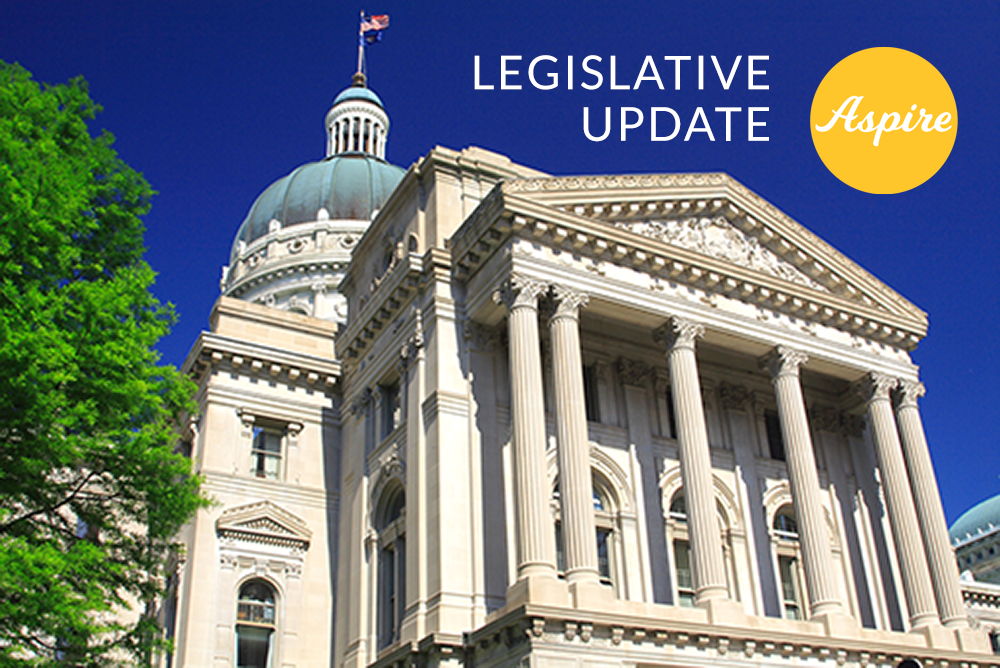Statehouse Update: New E-Cigarette Tax and Broadband Funding Mark End of Session

The 2021 Indiana General Assembly ended last week. It was not “goodbye” but rather “see you soon.” Instead of adjourning sine die (Latin for without another day), the legislature simply adjourned so that they could return for a redistricting session, to override any potential gubernatorial vetoes, or to address any other pressing issue. We expect they will return this fall after the 2020 census data becomes available.
It was a strange end to an even stranger session – wearing masks, testifying to an empty room, historic bipartisan votes on the budget, and ending the session at 3 p.m. versus the late evening. It was a legislative session we will never forget.
Aspire will very soon produce an official 2021 legislative report including how our delegation voted on Aspire’s top issues. Here is where Aspire Johnson County’s priority issues stand at the immediate conclusion of the session.
Employer Liability: Aspire began working with legislative leadership last fall before the start of the session and joined several other chambers of commerce to testify in support of employer liability in both the House and the Senate. SB 1 passed through the Senate Judiciary Committee 8-3, and the full Senate 40-8. In the House, SB 1 passed through the Judiciary Committee 9-4, and the full House 72-21. The House made some changes to the original bill, which were approved by the Senate with a vote of 39-7. Governor Holcomb signed the bill into law on February 18th - one of the first bills signed into law this session and making his goal of having this law in place prior to the NCAA Men’s Basketball tournament in Indianapolis.
During the second half of the session, HB 1002 was used to clean up language to cover those that were missed in SB 1, namely, EMS and higher education. It passed the House Judiciary Committee with a vote of 9-3, and the full House 76-21. It then passed through the Senate Judiciary Committee 7-1 and passed through the full Senate 41-9. The House concurred to the Senate’s amendments 58-21. It is now awaiting signature by the Governor.
Broadband: The General Assembly stayed busy with several broadband-related bills. Four were filed in the Senate and four were filed in the House. In all, five bills passed out of their originating chamber. Aspire sent letters of support to each committee hearing the bills. Here is how the successful first-half-of-session bills fared in the opposite chamber.
SB 352 by Senator Houchin (R-Salem) dealt with OCRA’s grant process and INDOT right of ways. It was amended and passed unanimously through the House Energy, Utilities and Telecommunications Committee. On Third Reading, it passed through the House 93-1. The Senate voted to concur with the House’s amendments unanimously. It awaits the Governor’s signature.
SB 359, Senator Scott Baldwin’s (R-Noblesville) bill, would require INDOT to establish a broadband corridor program (dig once program), was amended, and passed 12-0 through the House Energy, Utilities and Telecommunications Committee. It passed through Third Reading in the House 94-1. The Senate concurred with the House’s amendments unanimously. It awaits the Governor’s signature.
SB 377, Senator Zay’s (R-Huntington) bill, would create a portal for reporting lack of broadband access and create better mapping. It was amended and passed out of the House Utilities, Energy and Telecommunications Committee 12-0. The bill passed through Third Reading 89-2. The Senate concurred unanimously with the House’s amendments. It awaits the Governor’s signature.
HB 1449, authored by Representative Ed Soliday (R-Valparaiso), became the broadband funding omnibus bill, and it incorporates a lot of language taken from the successful Senate bills mentioned above. It passed the Senate Utilities Committee 9-0 and was then referred to the Appropriations Committee, where it passed 13-0. It passed through the full Senate 50-0, and the House concurred with the Senate’s amendments 92-2. It has been signed by the Governor!
Related to broadband, it is important to note that the budget (HB 1001) contains $250 million for broadband expansion.
Tobacco Tax: There was a push from advocates this year to raise the cigarette tax and implement a tax on e-cigarettes. HB 1434, which would have raised the cigarette tax by one dollar, passed through the House Public Health Committee, but it ultimately died. The House’s version of the budget included a fifty-cent increase per pack on the cigarette tax (which would have brought it up to $1,50 per pack) and a ten percent retail tax on e-cigarettes. Advocates were hoping for as much as a two-dollar increase per pack.
The cigarette tax increase was removed from the budget in the Senate, but the final budget, HB 1001, does establish a tax on e-cigarettes. The electronic cigarette tax equals fifteen percent (15%) of the gross retail income received by the retail dealer for the sale of e-liquids and 25% for cartridges.
Work Share: Although several work share bills were introduced, the only one given a hearing (in either the House or the Senate) was SB 44, authored by Senator Eric Bassler (R-Washington). It was heard in the Senate Pensions and Labor Committee, but it was not given a vote, even though a majority of the members on the committee had signed onto the bill and would have voted to move it through. Aspire signed onto a letter of support for the bill with several other regional chambers of commerce.
Rep. Ryan Hatfield (D-Evansville) tried to amend work-share language into the budget bill, but the House rejected his amendment. Similarly, Senator Karen Tallian (D-Portage) proposed an amendment to HB 1152 which would have established a work share program, but it did not pass. The amendment failed 13-35, with all Aspire Johnson County’s delegation voting against the amendment. Unfortunately, the language was a long shot to get passed into a bill related to unemployment insurance fraud.
As we have been reporting, Aspire opposed several bills that would have harmed businesses and community development. Chiefly, we worked against the anti-transit push, beginning with SB 141, which passed through the Senate Appropriations Committee 7-5 (after a committee member changed his vote from no to yes) and passed through the full Senate 32-17. Aspire joined other chambers of commerce to testify in opposition to the bill. On the House side, the bill received a hearing, but not a vote, in the Roads and Transportation Committee and died.
The bill’s author, Senator Freeman, then proposed an amendment to a utilities bill (HB 1191) which would require IndyGo to reimburse utilities for costs associated with their operations retroactively to 2017. It was adopted.
IndyGo officials have also said that if the bills were to pass, more than $177 million in federal funding dedicated for the Blue and Purple lines would be in jeopardy because lack of funding could cause the agency to have to delay and/or redesign the projects.
When HB 1191 went to conference committee, Aspire continued to push legislators to remove the IndyGo language. In the final version of the conference committee report, the language was removed, and the issue is dead for the session.
